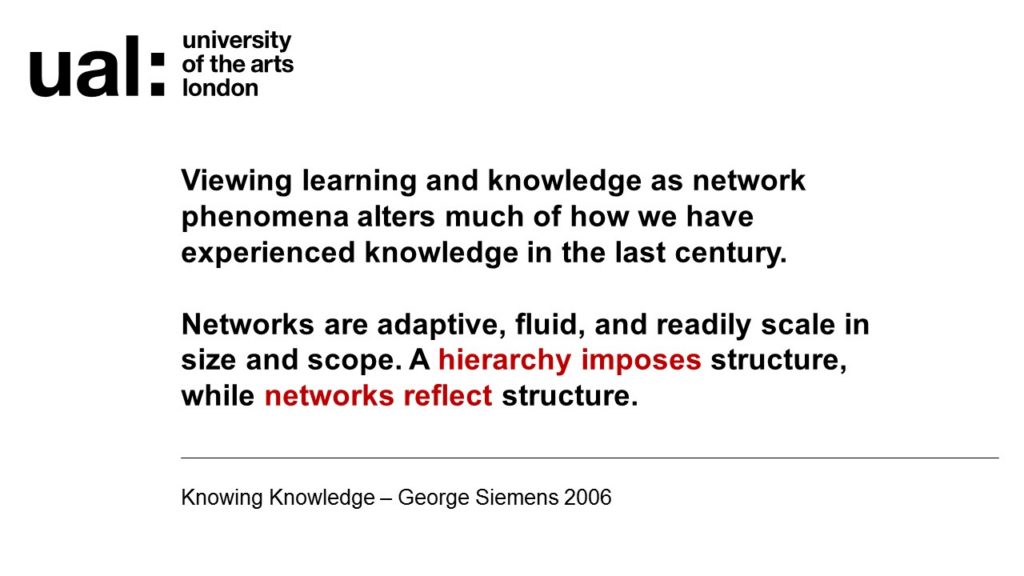Recently I was invited to speak at a hack event on Politics and Social Media for our Culture and Enterprise Programme at Central Saint Martins (the description of the event is below). The event was designed and facilitated by Richard Reynolds the course leader of the MA Applied Imagination in the Creative Industries (one of my favourite course titles of all time). Richard opened the day with a talk entitled “Politics, Social Media and the Practice of Ritual Magic” in which he made the distressingly convincing argument that Trump operates much like a magician or tribal mystic and his Tweets are in the form of ritual incantations.
I followed Richard with a talk on Trust and Digital Politics, in which I started by stating:

It’s easy to critique or satirise an individual but, following on from Richard’s talk, much more interesting to explore the factors that allowed Trump to gain and maintain power – especially as unless these conditions change we will see a succession of Trump-like leaders emerging in the West.
In terms of Trust I argued that the Digital has allowed us to Disintermediate institutions. The Web allows Trump to pronounce directly to ‘the people’ via Twitter, circumventing the media, the government and his own party.

Our trust tended to be placed in institutions which resonated with our values and we’d have faith, to a certain extent, that those institutions had integrity. Until recently political leaders in the West would represent or embody those institutions. Increasingly we see the emergence of the celebrity, or media, politician who uses political institutions as a vehicle for their persona.This is an inevitable effect of the cult-of-the-individual that the Web amplifies so efficiently. So we have lost the trust-mechanism of institutions which, for better or worse, represented identifiable ideologies and are now left with individuals whose primary aim is to seek power. (The struggles of Jeremy Corbyn in the UK are demonstrative of this shift away from ideologically focused politics towards new forms of political persona)
The video of my talk starts from this point so I won’t essay it all out here.
[embedyt] https://www.youtube.com/watch?v=AydoQtqM2Wg[/embedyt]
Ultimately, I agree with Paul Mason in his assertion that much of what we are experiencing can be understood as a “fight between network and hierarchy” which has been brought about by digital technology:

I see this fight taking place in education as much as in politics as we respond to the all pervasiveness of the Web. This was writ large for me as I prepared a session on Networked Learning for our Postgraduate Certificate Academic Practice in Art, Design and Communication. In a description of Connectivism George Siemens’ highlights the same tension between networks and hierarchies.

The challenge for us is in negotiating the relationship between network and hierarchy. Institutions embed and petrify power in structures which privilege particular groups. Networks tend to generate ‘mystics’ and ‘high priests’ who could, if they wished, operate without the balance hierarchical democracy can, but often doesn’t, bring. (A phenomenon I’ve seen occur within Connectivist courses). It’s complex, fascinating, and requires our immediate attention.
A WORLD OF OUR OWN: POLITICS and SOCIAL MEDIA
“The Future of Trust in Digital Politics”
(event description by Richard Reynolds)
Many of us are living in a post-truth world, a world defined by ‘alternative facts’. The Brexit referendum and its aftermath have been shaped by irrational trolling and online ranting. President Trump tweets his policy decisions. Terrorists and other outlawed groups use – or attempt to use – the same online platforms as government agencies. States wage hybrid warfare, and use online disinformation as a tool in their blended online/offline military strategies. Access to news is shaped and distorted by each individual’s known tastes and preferences. Citizens have uploaded their political life and identity, and sometimes struggle to make any connection back to the politics of the offline world.
It’s scarcely necessary to describe the impact that social media is having on politics. We only have to look at the outcomes of elections, referendums and other political conflicts around the world. More than simply a tool, Social Media has changed the way that politicians structure their careers, and the ways in which voters (and non-voters) engage with politics and respond to political debates. Social Media has become central to the ways in which governments articulate and impose the power of the state over its citizens.
On Friday 24 March and Saturday 25 March, the Culture and Enterprise Programme at Central Saint Martins will be hosting a two-day immersive conference and hackathon on the future of politics and social media. Expert guests will be sharing their views on the present and future role of Social Media in our political life. All delegates will have the opportunity to participate in a two-day interactive group project, which will attempt to answer the question: ‘What is the future of trust in digital politics?’